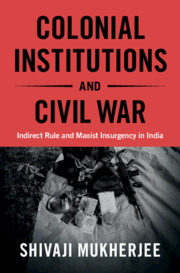Book contents
- Colonial Institutions and Civil War
- Cambridge Studies in Contentious Politics
- Colonial Institutions and Civil War
- Copyright page
- Contents
- Figures
- Tables
- Acknowledgments
- Part I Theory
- 1 Colonial Institutions and Civil War
- 2 Legacies of Colonial Indirect Rule: Weak State, Ethnic Inequality, and Insurgency
- 3 Varieties of Indirect Rule and Causal Pathways to Maoist Insurgency in India
- Part II Qualitative and Quantitative Testing
- Part III Generalizability
- Bibliography
- Index
- Series page
2 - Legacies of Colonial Indirect Rule: Weak State, Ethnic Inequality, and Insurgency
from Part I - Theory
Published online by Cambridge University Press: 15 May 2021
- Colonial Institutions and Civil War
- Cambridge Studies in Contentious Politics
- Colonial Institutions and Civil War
- Copyright page
- Contents
- Figures
- Tables
- Acknowledgments
- Part I Theory
- 1 Colonial Institutions and Civil War
- 2 Legacies of Colonial Indirect Rule: Weak State, Ethnic Inequality, and Insurgency
- 3 Varieties of Indirect Rule and Causal Pathways to Maoist Insurgency in India
- Part II Qualitative and Quantitative Testing
- Part III Generalizability
- Bibliography
- Index
- Series page
Summary
In this chapter, I show that existing theories of colonial legacies in South Asia cannot explain the full spatial variation of Maoist control in India. I engage with alternate explanations by Verghese (2016) and Iyer (2010) and show empirical and conceptual weaknesses in their arguments. Different types of colonial indirect rule created the ethnic inequalities and weak state capacity that are exploited by the Maoist rebels to foment insurgency and need to be included in the theoretical framework to explain this spatial variation. I develop a general theoretical framework of how colonial indirect rule can create opportunity structures in the form of weak state, ethnic mobilization networks in the form of excluded ethnic groups with grievances, and how these structural conditions are then exploited by rebel leaders who provide ideological frames of rebellion to start and sustain rebellion. While none of these conditions is sufficient to produce rebellion, rebel agency in the form of ideological frames in conjunction with such opportunity structures and ethnic networks is a jointly sufficient condition to explain insurgency. My theory conceptualizes rebellion as part of a long-term process of state formation unlike the current myopic frameworks of civil war theory.
Keywords
- Type
- Chapter
- Information
- Colonial Institutions and Civil WarIndirect Rule and Maoist Insurgency in India, pp. 26 - 55Publisher: Cambridge University PressPrint publication year: 2021
- 1
- Cited by

